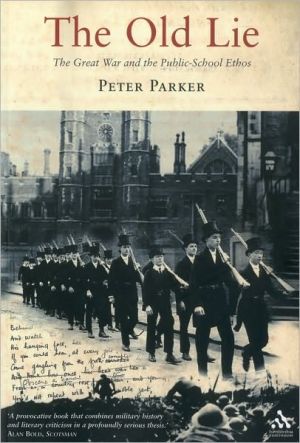

 |

|

The average rating for Old Lie: The Great War and the Public-School Ethos based on 2 reviews is 4.5 stars.
Review # 1 was written on 2016-01-02 00:00:00 LEE LITTLETON LEE LITTLETONThe Old Lie is about World War I and British public schools, more specifically about the way in which the public schools created an officer caste that believed the greatest achievement possible for them was to die young in battle. (Apply the words "glory" and "heroism" and "chivalry" to taste.) Parker goes into great detail, with seemingly endless primary sources, to show that not only were the young men of Britain being told that that was what they should want, but for many of them, it was true. They internalized this ethos, interpolated themselves into its systm, and participated enthusiastically in the indoctrination of their younger brothers (both literal and metaphorical). And they died. Horribly. Unheroically. Unromantically. For reasons that had nothing at all to do with the reasons they were willing to die. "Poppies for young men," as Sting says, "death's bitter trade." This is a fascinating book, and an appalling one. The alien lunacy of the primary sources belies the fact of their historical proximity. Although it trivializes Parker's project to reduce it to merely a useful secondary source, it is true that The Old Lie helped me understand the undercurrents of The Unpleasantness at the Bellona Club. Parker is so steeped in his subject, that I suspect some of his argument was actually lost to me because I'm not familiar enough with either the British public school system or the poetry of WWI. Or World War I itself. (I could seriously have used an apparatus of annotations.) But despite that, this was an illuminating read on a subject I find difficult to get my head around. |
Review # 2 was written on 2009-01-26 00:00:00 Hilda Corbett Hilda CorbettThe great British Public Schools were the formative ground for the ruling classes of the 19th and early 20th Centuries in Britain. From the reforms of Dr. Thomas Arnold at Rugby in the mid-19th Century, the Public Schools evolved a comprehensive curriculum and ethos that was inculcated into generations of boys and young men. This ethos, in turn, informed and lead to the generation that would go on to lead during the battles in the trenches of the First World War. And that was where the ethos would be broken. Parker traces the changes and the development of that ethos, one of service, Christianity, structured society, and a sanitized Classicism. He shows how the expansion of the Public Schools coopted the affluent middle classes and aligned them with the ruling upper classes. In turn, the use of Missionary efforts and the literature of the Public School story helped to bring the working classes into the same ethos. Parker balances his tracing of the Public School ideal with a look at how the experiences of the trenches lead to the writings of Siegfried Sassoon and Owen (and others) which changed the idea of "Dulce et Decorum Est Pro Patria Mori" from a value to live by to "The Old Lie." At the same time, it is also admitted that the same ideal that lead so many Public School graduates to the trenches was also of some small value of helping to sustain them through their experiences and providing a framework to help them interpret those same experiences. This book would be of value for someone interested in the lines of thought that lead up to the First World War and who wanted to know how and why people were so eager at the start of the war. |
CAN'T FIND WHAT YOU'RE LOOKING FOR? CLICK HERE!!!